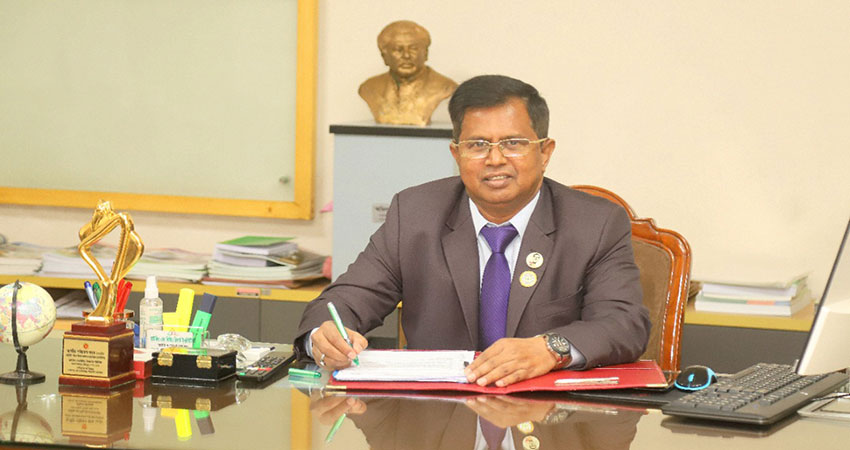25th May is the 123rd birth anniversary of our national poet Kazi Nazrul Islam.He produced a large body of poetry and music with themes that included religious devotion and rebellion against oppression. Nazrul's activism for political and social justice earned him the title of "Rebel Poet".Nazrul's writings explored themes such as freedom, humanity, love, and revolution.
He opposed all forms of bigotry and fundamentalism, including religious, caste-based and gender-based discrimination. Nazrul wrote short stories, novels, and essays but is best known for his songs and poems. He profusely enriched ghazals in the Bengali language.
He is also known to have experimented with Arabic, Persian, and Sanskrit words in his works to produce rhythmic effects.His writings greatly inspired Bengalis of East Pakistan during the Bangladesh Liberation War.
Nazrul was born in 1899 in the village of Churulia, Asansol Sadar, Paschim Bardhaman district of the West Bengal, India. Nazrul's father Kazi Faqeer Ahmed was the imam and caretaker of the local mosque and mausoleum. Nazrul's mother was Zahida Khatun. Nazrul had two brothers, Kazi Saahibjaan and Kazi Ali Hussain, and a sister, Umme Kulsum.
He was nicknamed "Dukhu Miah". Nazrul studied at a maktab and madrasa, run by a mosque where he studied the Quran, Hadith, Islamic philosophy, and theology. His father died in 1908 and at the age of ten, Nazrul took his father's place as a caretaker of the mosque to support his family. He also assisted teachers in the school. He later worked as the muezzin at the mosque.
Attracted to folk theatre, Nazrul joined a travelling theatrical group "leto" run by his uncle Fazle Karim. Nazrul composed songs and folk plays for the group.Through his work and experiences, Nazrul began studying Bengali and Sanskrit literature. In 1910, Nazrul left the group and enrolled at the Searsole Raj High School in Raniganj.
He later transferred to the Mathrun High English School. Unable to continue paying his school fees, Nazrul left the school and joined a group of kaviyals. Later he took jobs as a cook at Wahid's, a well-known bakery of the region, and at a tea stall in the town of Asansol.
In 1914, Nazrul studied in the Darirampur School in Trishal, Mymensingh District.
Amongst other subjects, Nazrul studied Bengali, Sanskrit, Arabic, Persian literature and Hindustani classical music under various teachers who were impressed by his dedication and skill.He studied up to grade 10 but did not appear for the matriculation pre-test examination. In 1917, he joined the British Indian Army at the age of eighteen.
Attached to the 49th Bengal Regiment, he was posted to the Karachi Cantonment, where he wrote his first prose and poetry. He learned Persian poetry from the regiment's Punjabi Moulvi, practiced music, and pursued his literary interests. His first prose work, "BaundulerAtmakahini" was published in May 1919. His poem "Mukti" was published by the Bengali Muslim Literary Journal in July 1919.
Nazrul left the British Indian army in 1920 and settled in Calcutta. He published his first novel "Bandhan-hara" in 1920. His first collection of poems, which included "Bodhan", "Shat-il-Arab", "Kheya-parer Tarani", and "Badal Prater Sharab", received critical acclaim. Nazrul grew close to other young Muslim writers, while working at the Bengali Muslim Literary Society.
Nazrul reached the peak of his fame in 1922 with "Bidrohi", which remains his most famous work, winning the admiration of India's literary society for his description of a rebel. He followed up by writing "Pralayollas", and his first anthology of poems, the "Agni-veena" in 1922. He also published a volume of short stories, the "Byathar Dan" and "Yugbani", an anthology of essays.
Nazrul started a bi-weekly magazine, "Dhumketu" on 12 August 1922. Earning the title of the "rebel poet", Nazrul aroused the suspicion of British Raj authorities. The Police raided the office of Dhumketu after it published "Anondomoyeer Agomone", a political poem, in September 1922. Nazrul was arrested on 23 January 1923 and charged with sedition.
Being released from prison in December 1923,Nazrul composed numerous poems and songs during his period of imprisonment. In prison, Nazrul wrote the "Rajbandir Jabanbandi".Rabindranath Tagore dedicated his play "Basanta" to Nazrul in 1923. Nazrul wrote the poem "Aj Srishti Shukher Ullashe" to thank Tagore. His book "BisherBanshi" wASpublished in August 1924.
On 16 December 1925, Nazrul began publishing "Langal", a weekly and served as its chief editor. During his visit to Cumilla in 1921, Nazrul married Pramila Devi on 25 April 1924.
Nazrul vastly contributed to enriching ghazals in Bengali, transforming a form of poetry written mainly in Persian and Urdu. Nazrul's recording of Islamic songs was a commercial success.
His works changed significantly from the rebellious exploration of society to deeper examination of religious themes. His works in these years led Islamic devotional songs into the mainstream of Bengali folk music, exploring the Islamic practices of namaz, Roza, Hajj, and zakat.
Nazrul believed in the rights of women.Nazrul's poems strongly emphasized the confluence of the roles of both sexes and their equal importance to life.
Nazrul wrote and composed music for nearly 4,000 songs collectively known as Nazrul Geeti. In 1942 at the age of 43, he began to suffer from an unknown disease, losing his voice and memory. On 24 May 1972, Nazrul brought to the newly independent Bangladesh to live in Dhaka.
In January 1976, he was accorded the citizenship of Bangladesh. Despite receiving treatment and attention, Nazrul's physical and mental health did not improve. In 1974, his youngest son, Kazi Aniruddha, died, and Nazrul soon succumbed to his long-standing ailments on 29 August 1976.
In accordance with a wish he had expressed in one of his poems, he was buried beside a mosque on the campus of the University of Dhaka.
Writer: Columnist, and Asst Officer, Career & Professional Development Services Department (CPDS), Southeast University.



















